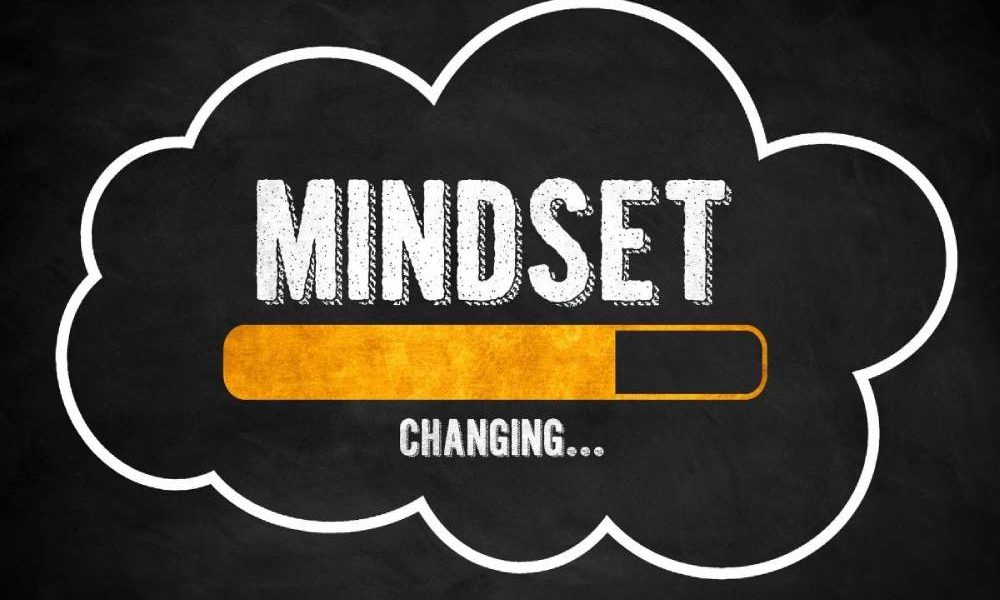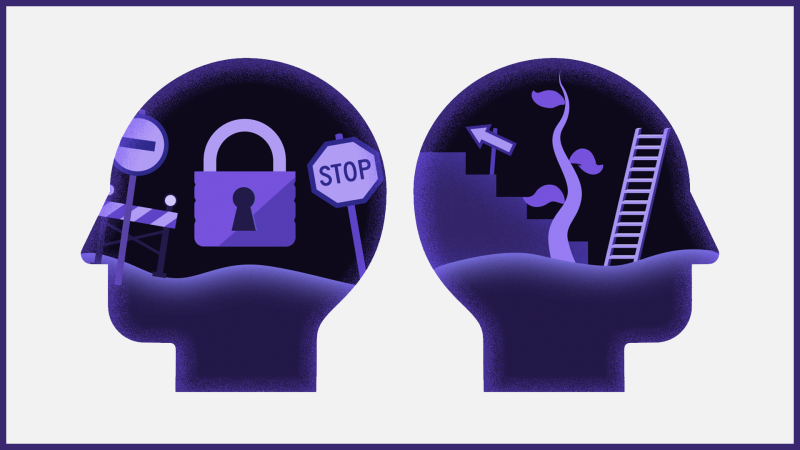

Your mindset sets the foundation for the way you experience your life. The exact same events can happen to two different people, and each person’s brain will interpret the happenings and react differently. This, in turn, will cause different consequences to follow. This happens largely because each of us has distinct past experiences that impact how our physical brains function and form belief systems. These things influence how your brain makes sense of the world. And it’s going to be different for each of us.
In a sense, your brain really does create your reality.
Your brain and your beliefs primarily create your mindset. Research shows that your mindset plays a significant role in determining your life’s outcomes. Unknowingly, your mindset can contribute to depression, anxiety, and other mental health issues and cause you to miss opportunities leading to a more limited life.
The good thing is that even though you may not have had any part in consciously constructing the mindset you have today, you can change it.
When you become conscious of your mindset, you can intentionally begin to guide it to help you improve your life, physical and mental health, decrease stress, and become more resilient. While I strongly do not endorse “just think positive“(mindset is more than that), science has proven that your thoughts and mindset affect your life in many ways – both good and bad.
You choose.

What is Mindset and Where Does It Come From?
Your mindset is the lens through which you see your life.
As a baby, you observe the people around you. Like a sponge, your brain absorbs their words, behaviors, and emotional reactions and how they explain the world. Whether beliefs are imparted explicitly or not, you learn “truths” about life and the world just by watching and interacting with your particular environment. As you continue in life, family, school, friends, church, TV, and the internet all contribute to your brain formulating your unique belief system.
If your parents work hard, achieve affluence, and value success, then you will most likely form the belief that monetary success is important. If your parents don’t show emotions, aren’t open to healthy discussions, and dissuade you from expressing your feelings, needs, or opinions, you learn that these things aren’t “safe” and to bury them.
Because of neuroplasticity, when you think the same thoughts repeatedly, they become etched into your physical brain and part of your mindset. Repeated thoughts literally form pathways in your brain by making connections between neurons which then become the default thinking patterns for you. In the article, What Stress Does to Your Brain, Jo Marchant, Ph.D. in genetics and medical microbiology and author of Cure: A Journey into the Science of Mind Over Body, explains it this way:
Your brain reflects the way that you think throughout your life. You kind of shape it by your thoughts and your behaviors. If you play violin for eight hours a day, then the parts of the brain responsible for helping you to play the violin will get larger. If you’re thinking stressful thoughts for the whole day then those parts of the brain are going to get larger and other parts of the brain will deteriorate.”

Two Basic Types of Mindset
According to Stanford psychologist Carol Dweck, there are two basic mindsets: fixed and growth. Which view you adopt influences a large part of your behavior, your relationship with success and failure in both professional and personal contexts, and ultimately your capacity for happiness.
Fixed
If you have a fixed mindset, you believe your attributes and abilities are inherently fixed and unchanging. This view also tends to think that talent and intelligence alone lead to success. The effort expended is not a relevant factor.
When you have this fixed view, you can get preoccupied with trying to prove to yourself and others that whatever level of talent and skill you have is “enough.” Because you can’t change what you are born with, you’re stuck with the amount of a certain trait. This type of fixed thinking often leads to depression and other mental health issues because there is no path for you to overcome challenges.
Growth
On the other hand, if you have a growth mindset, you believe that talents and abilities can be developed over time through effort and persistence. I’m not saying that this attitude means you believe that anyone can magically become Einstein or Mozart just by trying hard enough. However, it does mean that you believe anybody can get smarter or more talented or happier or whatever — if they work at it.
If you have this perspective you tend to see your intelligence, skill, talent, and success as starting points with the capacity to grow. You can see various steps you can take to develop and improve. This approach believes that your basic qualities are flexible and can progress with time and effort.
The Work of Carol Dweck
The research of Stanford psychologist Carol Dweck is the basis of our understanding of mindset. In her book, Mindset: The New Psychology of Success, she explores the power of our beliefs, both conscious and unconscious, and how even the simplest changes can have a measurable impact on almost every aspect of our lives. Dweck determined that the major difference between the two mindsets is that a growth-oriented one creates a passion for learning whereas a fixed view creates a need for approval.
She writes:
For twenty years, my research has shown that the view you adopt for yourself profoundly affects the way you lead your life. It can determine whether you become the person you want to be and whether you accomplish the things you value.
…This growth mindset is based on the belief that your basic qualities are things you can cultivate through your efforts. Although people may differ in every which way — in their initial talents and aptitudes, interests, or temperaments — everyone can change and grow through application and experience.
Do people with this mindset believe that anyone can be anything, that anyone with proper motivation or education can become Einstein or Beethoven? No, but they believe that a person’s true potential is unknown (and unknowable); that it’s impossible to foresee what can be accomplished with years of passion, toil, and training.”
Science Proves Your Mindset Affects Your Reality
Modern research has proven that your mindset can influence your body and life in measurable ways. Some examples of this are:

Exercise
Harvard psychologist Ellen Langer studied hotel maids. Even though these women spent all day moving their bodies by pushing vacuum cleaners, going up and down steps, bending, and stretching, 67 percent of them said they got no exercise. At the beginning of the study, Langer’s team measured the maids’ body fat and other physical health statistics. The findings matched the maids’ perceived lack of exercise, rather than their actual amount of exercise.
Next, Langer divided the maids into two groups. In the first group, she explained to them how many calories they were burning at their jobs. She also told them told that their activity level met the US Surgeon General’s definition of an active lifestyle. The other group did not receive similar information. Both groups just did their jobs as usual.
A month later, the researchers took the same physical measurements of the women in both groups and found surprising results. The group that had been told their job activity qualified as exercise saw a decrease in weight and waist-to-hip ratio and a ten percent drop in blood pressure. A survey revealed that none of the maids had changed their routines in any way. The only difference was in how one group viewed what they did. According to Langer, if you believe that you’re exercising, then your body responds as if you are.

Sleep
One study showed that being told you slept well or poorly determined how people’s bodies physically responded. In the study, scientists explored how people’s perception of sleep quality influenced their feelings and performance by assigning them to four conditions: “above average” sleepers, “below average” sleepers, and two control groups.
The researchers explained the effects of REM sleep on sleep quality and told participants that average REM sleep should be around 20–25 percent of total sleep. People in the groups assigned a sleep quality were fitted with sensors and told that the researchers were monitoring vital signs and REM sleep. This was not true.
The “below-average” group was led to believe they got 16.2 percent REM sleep, while the “above-average” group was told they got 28.7 percent REM sleep. Researchers even gave participants fake brainwave graphs and official-looking spreadsheets to make the experiment more convincing.
After the sleep test, the researchers administered several cognitive tests using basic mathematical and verbal skills. People who were told they had low-quality sleep performed worse on the tests and showed more cognitive deficits, than the control and high-quality sleep groups.

Luck
By the standard definition, luck is pure chance — something outside of your control. However, social scientists see luck as the result of personal actions and an openness to new experiences, which may involve some risk. According to Richard Wiseman, Professor of Public Understanding of Psychology at the University of Hertfordshire in the U.K., some people appear to have an uncanny ability to be in the right place at the right time. But, he discovered a method behind it.
Wiseman began his research in the 1990s by testing self-proclaimed lucky and unlucky people to see if he could detect a difference. In one of his tests, he put a $20 bill in the street and watched who picked it up. He found was that lucky people noticed it but unlucky people did not.
He conducted more experiments and found that lucky people spotted opportunities while others did not. People who believe they’re lucky actively look for and are able to see opportunities that people who think they’re unlucky miss. Wiseman concluded that lucky people had a basic mindset to look for the good in everything.

You Can Change Your Mindset
You have the power to change your mindset. While you cannot control the random thoughts that spontaneously pop into your head, you can most definitely consciously choose your response to the thoughts you think. This is your chance to guide your mind to shape a more helpful mindset. You can challenge and replace your underlying assumptions about life. You don’t have to stay stuck where you are now.
In fact, simply learning about your mindset can help alleviate depression and anxiety. One study showed that after a single 30-minute session on growth personality mindset, teenagers with depression and anxiety showed higher levels of internal control and a better ability to cope with stress. They learned that they are not victims of their circumstances. You can read more about how to develop a growth mindset here.










You must be logged in to post a comment Login